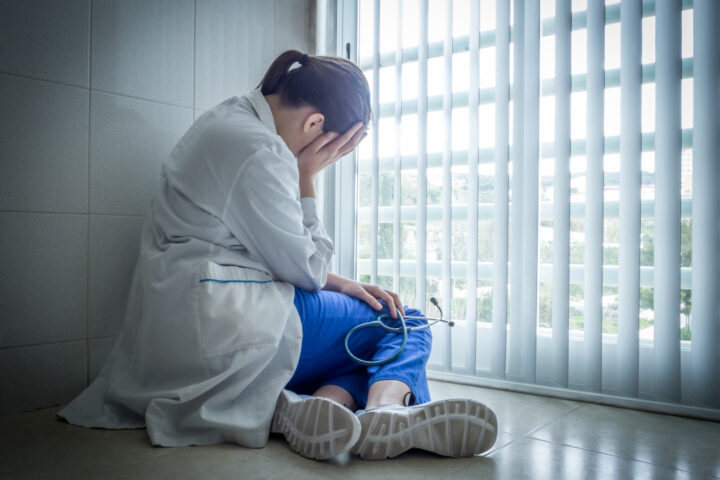“Mam, where’s our patient?!” As the OR nurse calmly enumerated a litany of reasons why our patient isn’t yet on the table as scheduled, I’m welling up with frustration. “Excuse me” I said. I silently went back to the empty OR dressing room. I threw a one-two punch -high kick in the air, closed my eyes, took a deep breath and sat momentarily. Grabbing my hospital coat, I went to the patients room, talked to the patient and tried fixing whatever I could, so the patient can have the procedure on a later time. I did that with all the warm smile I could muster. Deep inside? I was screaming for reason. “Am I still happy doing all these, despite the challenges?”
The news and internet is teaming with bleak stories of healthcare workers worsening mental health, burnout and job satisfaction. WHO recently updated its definition of burnout:
Burn-out is a syndrome conceptualised as resulting from chronic workplace stress that has not been successfully managed. It is characterised by three dimensions: (1) feelings of energy depletion or exhaustion; (2) increased mental distance from one’s job, or feelings of negativism or cynicism related to one’s job; and (3) reduced professional efficacy. Burn-out refers specifically to phenomena in the occupational context and should not be applied to describe experiences in other areas of life.
WHO, 2019
Evidence points to a staggering 1 in 2 healthcare workers has had or is experiencing burnout. Yes thats 50% of health workers! Burnout evidently affects health professional mental status and is tied to job satisfaction according to recent studies.
T1. Have you experienced or is experiencing burnout in the healthcare workplace? Please describe.
Don’t get me wrong. I’m not turning a blind eye to the systemic problems besetting the health care industry. The causes of health workers burnout are multifactorial and systemic.

professional well-being.
I am for systemic solutions and we need it yesterday, or maybe five years ago. But while our health leaders are drafting solutions, we’re left to cope with burnout and find happiness in an adverse workplace. By that I mean, finding happiness on a personal level, cherry picking “tips and tricks” to cope with burnout, perform above par at and still appreciate the career we so love doing. It’s not unusual nowadays to be approached by a colleague asking “How do you find happiness in this shit hole of a workplace?!” Cynical, but a very positive way of looking for happiness in the chaotic sea of workplace challenges.
T2. How do you find happiness in your healthcare workplace? Please elaborate.
Systemic solution are often innovative to induce radical changes in the health care industry. The US National Academy of Medicine came up with a systems framework for addressing health professionals mental well being. I’m hopeful our health leaders will get their acts together and come up solutions to this problem. These solution need to trickle down to the grass root health workers fast. By fast, I mean five years ago. In the meantime, we’re left to cope with burnout and find happiness in the workplace. If these personal “tip and trick” miraculously worked for us, we happily share it to our colleagues and sometimes with our bosses or managers.
T3. What workplace happiness would you share to a colleague or even to your boss and managers?
Join #HealthXPh tweet chat this Saturday 9PM Manila time as we discuss coping with health professions burnout by finding happiness in what we do. This should guide you through the discussions:
- T1. As a health professional/student, have you experienced or is experiencing burnout in the workplace? How did you cope up with it?
- T2. As a health professional/ student, how do you find happiness in your workplace?
- T3. What workplace happiness would you share to a colleague or even to you boss and managers?
See you all on Saturday!
References:
National Academies of Sciences, Engineering, and Medicine. 2019. Taking Action Against Clinician Burnout: A Systems Approach to Professional Well-Being. Washington, DC: The National Academies Press. https://doi.org/10.17226/25521.
Shanafelt TD , Balch CM , Bechamps GJ , et al . 2009. Burnout and career satisfaction among American surgeons. Ann Surg 2009;250:107 15. doi:10.1097/SLA.0b013e3181ac4dfd
Rosales, Rheajane & Labrague, Leodoro & Rosales, Gilbey. (2013). Nurses’ Job satisfaction and Burnout : Is there a Connection?. International Journal of Advanced Nursing Studies. 2. 10.14419/ijans.v2i1.583.
Jabonete, Fritz Gerald & Dayrit, Aubrey. (2018). Reported Work-related Stressors among Staff Nurses in Metro Manila, Philippines.
#HCLDR. (2019, December 5). Reconnecting To Joy in Work [Blog post]. Retrieved from https://hcldr.wordpress.com/2019/12/05/reconnecting-to-joy-in-work/
Credit: Image by Halcyon Marine Healthcare Systems from Pixabay




